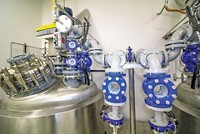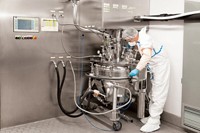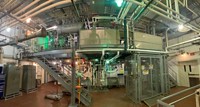Advertisement
Grab your lab coat. Let's get started
Welcome!
Welcome!
Create an account below to get 6 C&EN articles per month, receive newsletters and more - all free.
It seems this is your first time logging in online. Please enter the following information to continue.
As an ACS member you automatically get access to this site. All we need is few more details to create your reading experience.
Not you? Sign in with a different account.
Not you? Sign in with a different account.
ERROR 1
ERROR 1
ERROR 2
ERROR 2
ERROR 2
ERROR 2
ERROR 2
Password and Confirm password must match.
If you have an ACS member number, please enter it here so we can link this account to your membership. (optional)
ERROR 2
ACS values your privacy. By submitting your information, you are gaining access to C&EN and subscribing to our weekly newsletter. We use the information you provide to make your reading experience better, and we will never sell your data to third party members.
Business
Fine Chemicals Upswing
At CPhI, suppliers say they are spending again
by Rick Mullin
October 8, 2007
| A version of this story appeared in
Volume 85, Issue 41

THE 20,000-PLUS ATTENDEES at CPhI, the conference on pharmaceutical ingredients, climbed stairs, rode escalators, and planned for lengthy walks between appointments at the sprawling Milano Fiera Rho exposition center in Milan last week, where the fine chemicals industry showcased new technologies and investments. By most accounts, the industry's comeback from a years-long slump is still in full swing.
For many chemical companies in attendance, the investments are aimed at attracting business from start-up pharmaceutical firms. These small companies typically require highly specialized chemistry, manufacturing starting at preclinical stages, and a range of other services that big pharma customers don't need.
Isochem CEO Thierry Malfroot told C&EN that "2004 was the black year for Isochem. But each year, we have done a little bit better than the previous year." Isochem, the fine chemicals unit of the state-owned French company SNPE, expects to finish 2007 with revenues 3% higher than earlier estimates.
Xavier Jeanjean, Isochem's sales director, attributes the comeback to a broadening of analytical and regulatory services and a reorganization of R&D. Together, the changes have boosted business with emerging drug companies, which now account for 40% of Isochem's revenue.
This year, the firm invested $4 million in improving pilot-manufacturing capabilities. Meanwhile, Malfroot disclosed that SNPE is "very, very close to a sale" of its peptides business, NeoMPS, which has facilities in Strasbourg, France, and San Diego. SNPE has said it will sell all of Isochem in the next two years.
Also investing in facilities is Carbogen Amcis, which has spent nearly $8.5 million on its three Swiss operations during the past year, adding microreactors in Neuland, crystallography capacity in Aarau, and a large-scale liquid chromatography unit in Bubendorf, according to CEO Mark Griffiths.
Griffiths said Carbogen's acquisition by India's Dishman Pharmaceuticals & Chemicals last year has allowed the Swiss firm to pursue a "different business model." He said it can take on larger projects with support from India and a Dishman-owned nonpharmaceutical synthesis plant in Manchester, England. Its Swiss facilities can concentrate on their specialty: manufacturing high-potency drugs.
With this package, Griffiths said, Carbogen is well-positioned to pursue synthesis of cancer therapies on behalf of start-up drug companies that, if successful, are likely to be purchased by major drugmakers. "If you are in there at the early stage," he said, "you generally move forward with the project" following any acquisition.
Fine chemicals companies continue to shy away from the massive expansions and acquisitions of the late 1990s. But a spate of smaller investments in niche technologies was announced at CPhI.
SAFC is building a new plant in St. Louis devoted to the conjugation of highly potent pharmaceutical chemicals to delivery molecules such as monoclonal antibodies. Expected to open by the end of the year, the production suite will produce early-stage clinical supplies of conjugates and have room for expansion.
Ash Stevens said it has invested about $2.5 million during the past eight months to add high-containment capacity at its Riverview, Mich., site. The expansion includes a 100-L pilot plant with cryogenic capabilities. The pilot plant allows Ash Stevens to model a process in the lab and seamlessly bring it to full-scale production, said CEO Stephen Munk.
Meanwhile, Ampac Fine Chemicals plans to invest $3.3 million at its Rancho Cordova, Calif., facility. The expansion will support customers' compounds in Phase I or II clinical trials while further extending its continuous-processing capabilities.
Flamma, the Italian contract manufacturer, is lowering costs with a new R&D facility in Shanghai and a manufacturing joint venture in Gongan, China. The company, which specializes in amino acid chemistry, has also spent some $11 million to increase capacity at its Bergamo, Italy, plant by 40%, according to Beppe Gornati, commercial director.
The Italian investment is almost half of the firm's annual sales of about $25 million. "It is a very big investment for us," Gornati acknowledged, "but we need to make it, and we can afford it at this time."







Join the conversation
Contact the reporter
Submit a Letter to the Editor for publication
Engage with us on Twitter